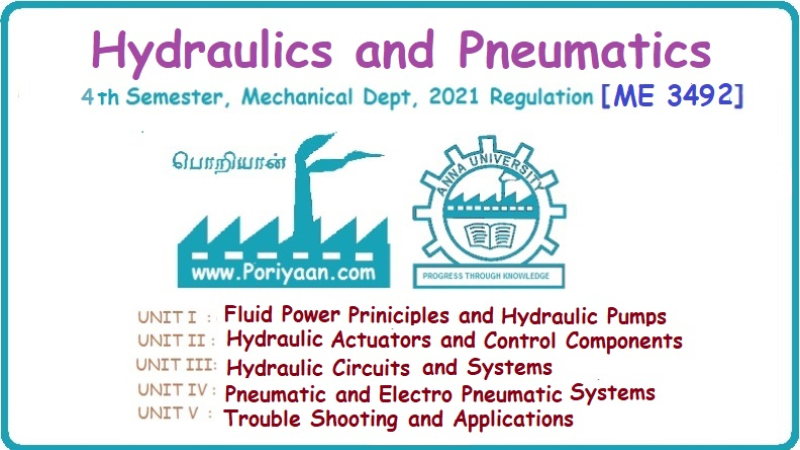Hydraulics and Pneumatics: Unit I: Fluid Power Priniciples and Hydraulic Pumps
Introduction to Fluid Power
Fluid Power Priniciples and Hydraulic Pumps - Hydraulics and Pneumatics
Almost all the development of our present level of technology depends on the evolution of methods for the generation, distribution, and utilisation of power.
Unit 1. Fluid Power Principles and Hydraulic Pumps Chapter 1: Introduction to Fluid Power Chapter 2: Hydraulic Fluids and their Properties Chapter 3: Basics of Hydraulics Chapter 4: Pumps - The Source of Hydraulic Power Chapter 1 "Technology, no matter how sophisticated, is useless if it outstrips the abilities of the people to understand, implement, and manage.” - William E. Scollard Educational research indicates we remember 20% of what we READ, 30% of what we HEAR, 40% of what we SEE 50% of what we SAY, 60% of what we DO, and 90% of what we HEAR, SEE, SAY and DO. "One machine can do the work of fifty ordinary men. No machine can do the work of one extraordinary man" - Elbert Hubbard Introduction to Fluid Power Learning Objectives While reading and after studying this chapter, you will be able to: • Understand and appreciate the use of fluid power. • Differentiate between fluid power systems and fluid transport systems. • Identify and compare the basic methods of transmit- ting power. • List out the basic elements of a fluid power system. • Recognize and explain the advantages and disad- vantages of fluid power. • Identify and appreciate the applications of fluid power in various industries/fields. • List the basic components required in hydraulic and pneumatic power systems. • Describe the basic working principle of hydraulic and pneumatic power systems. • Understand the difference between hydraulic, pneumatic, and electromechanical power systems. CHAPTER: 1 Introduction to FLUID POWER Almost all the development of our present level of technology depends on the evolution of methods for the generation, distribution, and utilisation of power. The energy requirements of the world increases at a faster rate day-after-day. This increasing demand for power requires the continued development of methods for power transmission, control, and utilization. Fluid power technology plays an important role in this task and also it promises to be even more important in the future. 1. Brief about Fluid Power The use of fluid power to help human being is probably as old as civilization itself. This is quiet evident from the following historical facts : (i) The water (fluid) was used to generate power through water wheels; (ii) The water (fluid) was transmitted/pumped for irrigation purpose by means of water wheels; (iii) The rivers (fluid) were used as transportation means (to move from one place to another using logs of wood); (iv) The wind (fluid) was used to drive windmills. The windmills were used to grind grains, to pump water, etc.; (v) The wind (fluid) was used to propel the ships; and (vi) The wooden valves were used to control water (fluid) flow through bamboo pipes. Since then, the fluid power technology has been advancing quiet remarkably. The use of fluid power equipment is increasing steadily throughout the world—not only in industrial sectors but also in household applications. Today we find the applications of fluid power in all the fields of engineering viz., mechanical, automobile, agriculture, marine, biomedical, mechatronics, production, aero space, defence, etc. Nowadays, the fluid power equipments are used in every walk of industrial life, such as hydraulic elevators, hydraulic presses, hydraulic jacks, hydraulic rams, pneumatic cranes, pneumatic hand tools, air brake system of automobiles and railway coaches, robots, earth-moving equipments, and so on. In this chapter, we shall present the concept, advantages, drawbacks, applications, and components of a fluid power system.1. INTRODUCTION
Hydraulics and Pneumatics: Unit I: Fluid Power Priniciples and Hydraulic Pumps : Tag: : Fluid Power Priniciples and Hydraulic Pumps - Hydraulics and Pneumatics - Introduction to Fluid Power
Related Topics
Related Subjects
Hydraulics and Pneumatics
ME3492 4th semester Mechanical Dept | 2021 Regulation | 4th Semester Mechanical Dept 2021 Regulation
